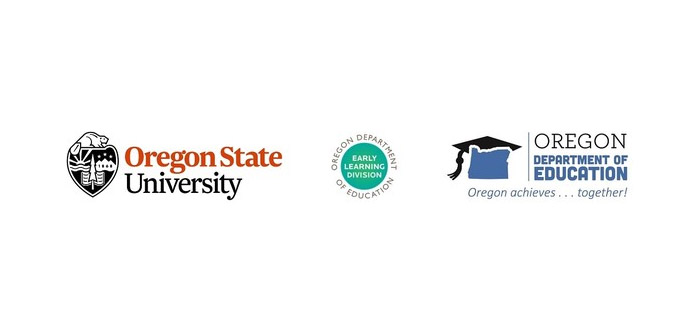The Oregon Department of Education (ODE), the Early Learning Division (ELD) and Oregon State University (OSU) are partnering to develop the Oregon Early Childhood Inclusion Coaching Collaborative. This collaborative is the first of its kind, focusing on early learners experiencing disabilities. It will assist regional early learning systems and early care and education professionals by offering training and support to regional coaches on how to best include children experiencing disabilities in classroom activities.
The collaborative is an additional layer to the coaching improvement work begun by ELD and OSU’s Early Learning System Initiative in 2021. The Early Learning System Initiative (ELSI) was developed to increase early access to high-quality, professional learning opportunities and technical assistance for the early education workforce in Oregon.
A $4.4 million investment from American Rescue Plan Elementary and Secondary School Emergency Relief (ESSER III) funds will provide for the creation of the collaborative.
“The development of this mentorship and outreach, and the plans to make high-quality supports and training accessible for professionals in publicly and privately funded programs across the early learning system removes barriers and empowers providers to use effective strategies to prevent suspension and expulsion of children who have been systematically excluded from education before, during and after the pandemic,” said Meredith Villines, Early Childhood Coherent Strategies specialist with ODE. “It’s an unprecedented effort to streamline funding to improve outcomes for systematically excluded children, especially children experiencing disability.”
Removing The Barrier To Student Success
Children experiencing disabilities have the right to be in high-quality early learning environments with other children their same age. Yet, less than 50% of Oregon’s roughly 12,000 identified children experiencing disabilities are fully included in these environments, according to the latest data on preschool placements and services in the Individuals with Disabilities Education Act federal annual report 2021.
Children who identify as Black, Indigenous and Latino/a/x and experience disability are more likely to be suspended, expelled or excluded at higher rates in early care and education programs. A smaller subset of students who are excluded, either through discipline or restricted access to general education, remain without access to equitable education opportunities as they enter kindergarten and move through their education, having dramatic impacts on their social, mental health, educational, economic outcomes and quality of life. This is supported by evidence collected by Portland State University for the Early Learning Division and national civil rights data on discipline from pre-K-12th grade.
The investment includes research and a review of the current state of inclusion and inclusive practices conducted by researchers with OSU’s Hallie E. Ford Center for Children and Families, the development of a strategic plan to guide future inclusion work at the state level and the development of Oregon Early Childhood Inclusion Modules for regional trainers and coaches. Training for communities, programs and providers will begin in fall 2023 in partnership with Oregon Early Childhood Inclusion Initiative Co-leads from ODE and the Early Learning Division, which will become the Department of Early Learning and Care (DELC).
Opportunities for Professional Development and Community Involvement
The collaboration addresses the most challenging barriers to inclusion including the lack of high-quality, coordinated and aligned cross-sector professional development and on-the-job support for the staff working in early learning environments.
As part of the collaboration, Oregon State University is hosting a new website to highlight training opportunities, reports, resources and connected efforts to support coaching and effective practices for equity and inclusion and highlight the team working on the project.
A Holistic Approach to Serving Oregon’s Children
The innovative collaborative represents one part of a holistic approach to serving Oregon’s children. Improving support for early learning educators is a goal recognized and driven by both ELD and ODE, and aligns with Oregon’s cross-sector early learning system plan, Raise Up Oregon. The Professional Learning System team at ELD, in partnership with OSU’s Early Learning System Initiative (ELSI), recently launched Coaching Competencies Guidance, which provides an equitable and holistic approach to early educator coach mentorship. Coaches will receive training that empowers them to be even greater support for early educators in public programs such as Preschool Promise, Head Start and Oregon Prenatal through Kindergarten (OPK).
With intentional efforts to improve Oregon’s early learning system, the Oregon Department of Education and the Early Learning Division seek to enhance the quality of early childhood education across the state. You can learn more about the new Coaching Competencies Guidance by visiting the ELD website.
Background on the Elementary and Secondary School Emergency Relief Funds in Oregon
Since 2020, Oregon has received $1.62 billion in Elementary and Secondary School Emergency Relief Funds to support the needs of all students, with a focus on historically excluded communities disproportionately impacted by the pandemic. The state has allocated 90% of its allotment to school districts to spend based on their community’s unique needs. ODE has distributed the other 9.5% (0.5% used for Administrative costs) to support 12 equity-driven initiatives designed to address unfinished learning; support the health, safety and mental wellness of our students and staff; and strengthen high-quality, culturally sustaining instruction and leadership. These initiatives are designed for all students and are specifically centered on equitably serving Oregon’s Black, Latino/a/x, Indigenous, Asian, Pacific Islander and Tribal students; students experiencing disabilities; students who identify as LGBTQ2SIA+; emerging bilingual; those navigating foster care, houselessness and poverty; and those with limited access to resources due to rural location.
Examples of ODE ESSER-funded projects include Strengthening Mental Health in Education, Jump Start Kindergarten and Culturally Specific After School Learning. More details about projects sponsored by ODE using ESSER funds can be found on the ODE website.





